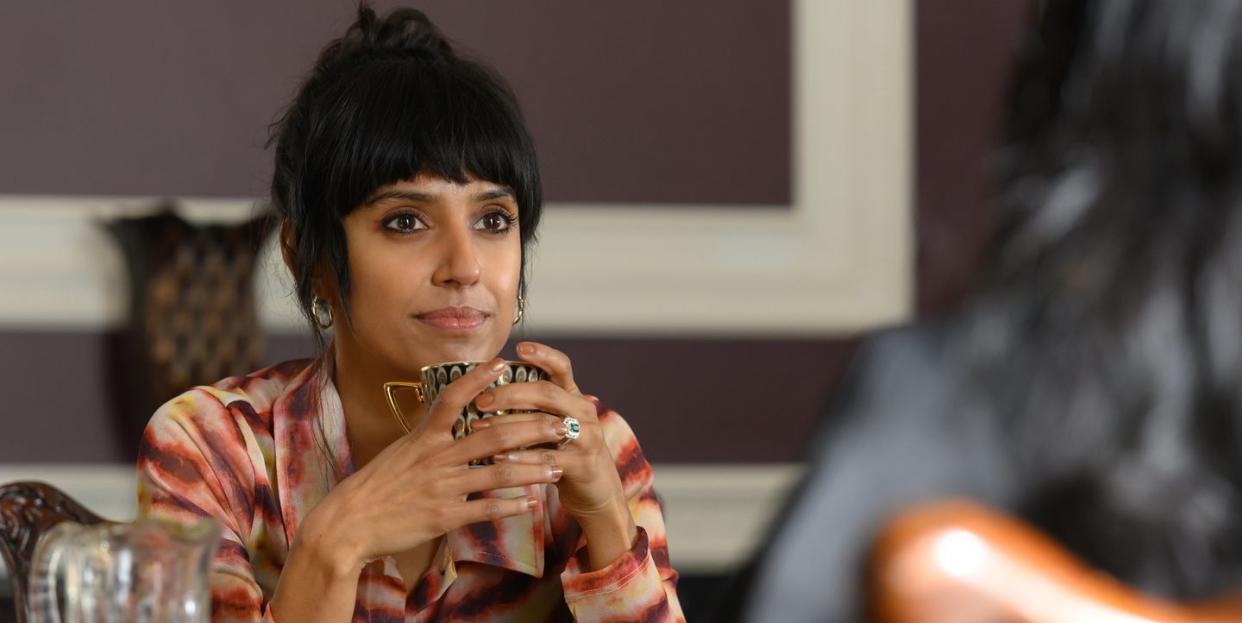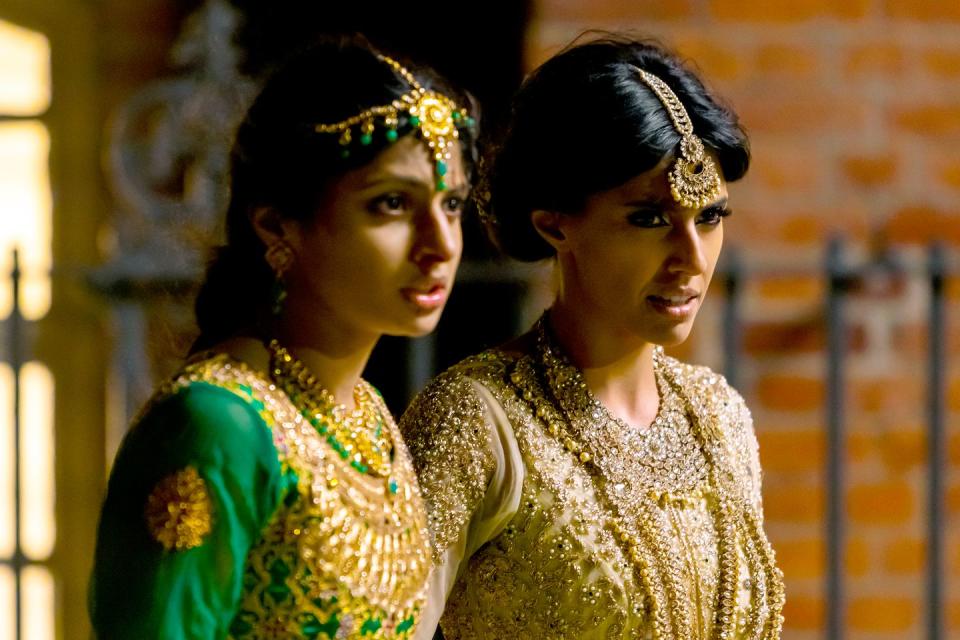Polite Society's Ritu Arya wants to help change South Asian roles on screen

Before she returns as Lila Pitts in The Umbrella Academy's final season, Ritu Arya is back on the big screen this weekend in the very different, but no less entertaining, action comedy Polite Society.
Written and directed by We Are Lady Parts creator Nida Manzoor, the new movie follows martial artist-in-training Ria Khan (Priya Kansara) who believes that she must save her older sister Lena (Arya) from her impending marriage to Salim (Akshay Khanna).
Ria senses that something darker is happening with her sister's marriage, so she enlists her friends to help stop her sister from tying the knot by attempting to pull off an ambitious wedding heist, all in the name of sisterhood.
Ahead of Polite Society's release in cinemas this Friday (April 28), Digital Spy sat down with Ritu Arya to talk about sibling relationships, changing the perception of South Asian roles on screen and what advice she'd give to her teenage self.
The strength of the film is based on the sibling relationship between Ria and Lena. Were you able to draw on your relationship with your brothers for the movie?
Ritu Arya: Yeah, definitely. I've got a younger and an older brother, and I feel like there's no relationship like it – this unconditional love [but also] no one winds you up more than a sibling. I mean, I didn't physically fight with my brothers, but the anger that you can have with each other, that was very easy to draw upon.
I also think there's this sense of responsibility that you can have as a sibling and definitely, for me, feeling like I want to be this good role model, especially to my younger brother, which isn't all the time. And the kind of shame I can feel if I'm not being my best self. Or if I need his help, there can be a real resistance.
You mentioned shame – in South Asian culture, that shame is something we feel so heavily. For Lena, she's at a crossroads where she's looking for where she wants to aim her focus. What was that like, to portray a character at that stage in their life?
I mean, super-relatable. I think this thing of feeling like we have to find our purpose, or the thing we want to do, is so strong in any culture, and just in society in general. And we have to choose so quickly. It can feel like a lot of pressure.
I definitely feel like I've been there where I haven't felt like I had a purpose, and so I'm just sort of filling this void with whatever or whoever is around, and not having the awareness, and it just being a massive blur. I think that's what Lena is going through at the beginning.
So when she meets this wealthy, hot guy, she's like, "My energy is going towards this". I think so many of us have been through that, too.
Also, it's learning that it's OK to not have this thing that you know you want to do. It doesn't have to just be about that. And forgiving ourselves, and being kinder to ourselves about that.

You're playing a new type of South Asian lead onscreen, and thankfully cinema is expanding the definition of what it means to be a South Asian actress and the kind of roles that you are able to play. Is that important to you?
I mean, definitely. Representation is a huge reason why I even got into acting. I wasn't seeing people that looked like me on my screen, and I thought, "Well, I'll be the change" and that's a huge motivation.
It's not the sole reason. I think I'd find that really hard, for it to just be some socio-political reason why I'm an actor.
It's genuinely because I find it really fun and I'm just a kid inside. I think we all are, actually. I think I couldn't do it if there wasn't the wholehearted joy of getting to be on set, and getting to play different characters, and explore humans and our behaviour.
Representation means so much to me, and I'm so proud of this movie because of that. I think that we are making great strides forward, but there is still so much further to go.
In the film, we see your little sister Ria doing anything that she can to protect you. She's got a lot of teenage emotion driving her. If you could go back and tell your teenage self something, what would you want her to know?
Oh my God, so much stuff. But you know what? No regrets, because everything happens for a reason, or if you choose for it too, at least. It could be a lot easier.
But maybe... to do your best, and not care so much what people think. I mean, I'm still telling myself that now, you know? So it's not necessarily a teenage thing. So, yeah, to not compare yourself to others. To compare yourself to you, and only you.
We're all on our own journey. And even if I said that to my teenage self, she wouldn't listen. She was a rebel. So I just think: you're not going to take advice. You're just going to learn the hard way. So just be kind to yourself, and enjoy it. [laughs]

That point about rebellion is key, and it's something that really comes through in Polite Society. Is there something that you want people to take away from the film?
I think that's a really good point because, yeah, to some people, it might be like, "These girls are unconventional".
Do whatever you're passionate about, regardless of what people say. They don't know what's right for you. No one does. So you may as well do what you enjoy. You're going to spend a lot of time doing it – even if that's not what everyone is doing around you.
I think similarly to what I just said to my teenage self, I think we really want to fit in, and we want to get validation from each other. So it can be really difficult to be like, "Right, I like doing this thing, so I'm going to do this instead". I get it. But that's such a stronger drive to follow your own compass and figure out what you like doing.
Polite Society is released in cinemas on April 28.
You Might Also Like

 Yahoo Movies
Yahoo Movies 
